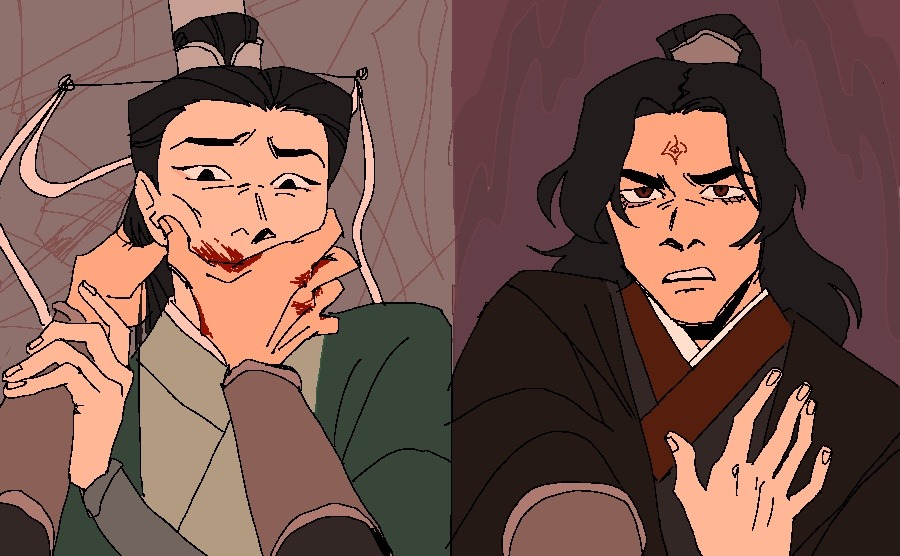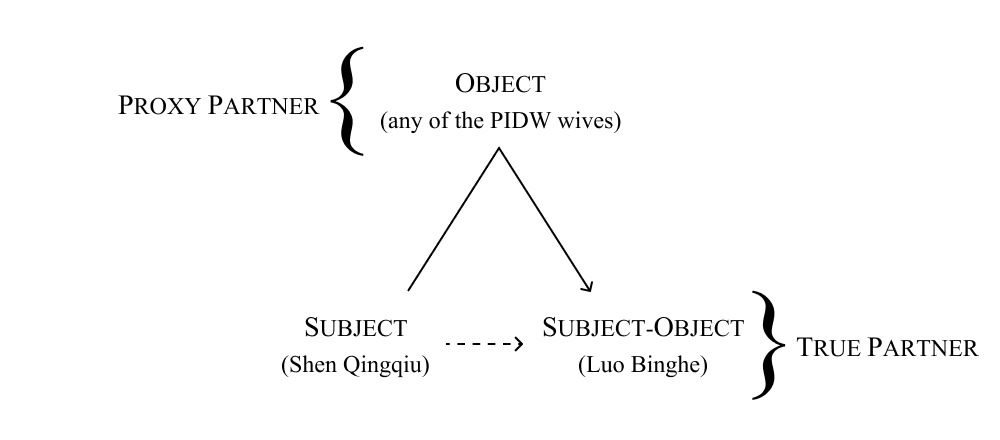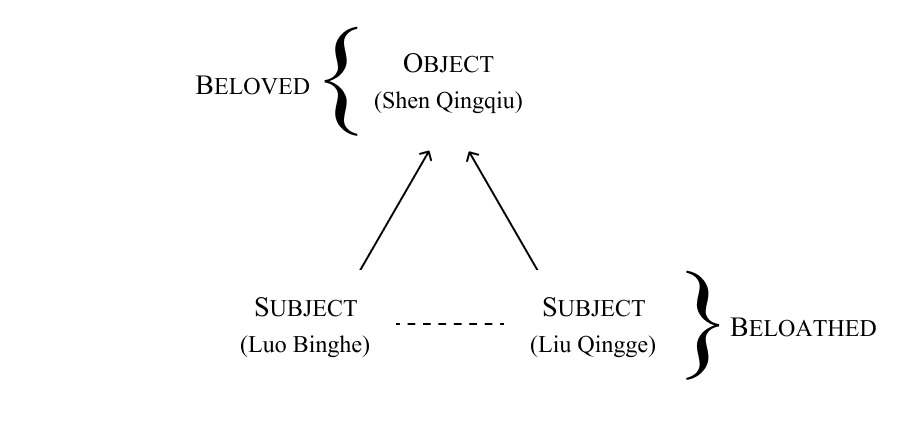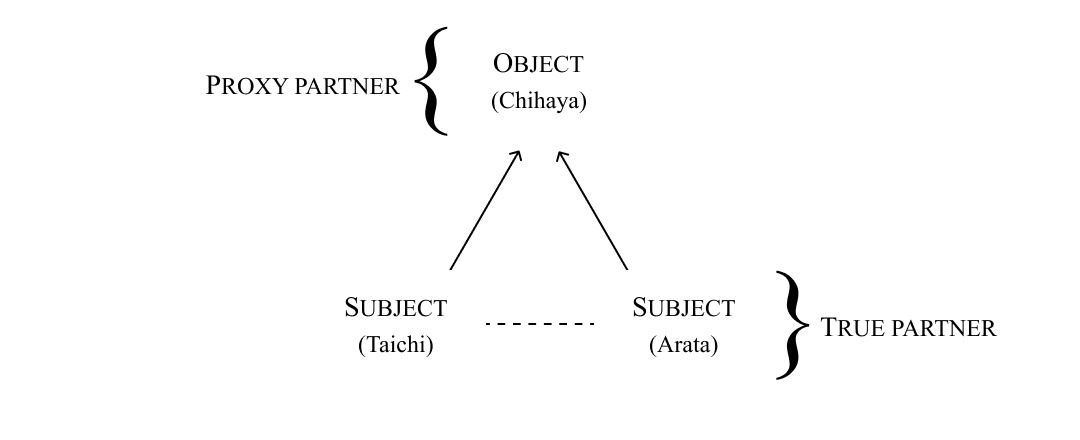My parents finally believed me the third time I came out to them in a frankly hilarious and homophobic misuse of materialist analysis (it took me having a girlfriend, which, sure, that is a difference in material conditions but come ON). In the years leading up to and since the dawn of this horrific time of my life, I processed my parents’ homophobia by reading tons and tons of fanfiction. As one does.
This has included phases of seeking out queernorm or otherwise un-homophobic, romance-focused escapist gay fanfiction, an obvious space of refuge that focuses on the interpersonal dynamics between characters.
It has also included phases of seeking out realist gay fanfiction, necessarily set in heteronormative worlds and full of all the attendant drama, including, at times, fraught family dynamics and homophobia. While this subtype of fanfiction sounds more obviously stressful to read, I found myself gravitating to it as much as I did escapist gay fanfiction in a textbook case of reparative reading.
Reparative reading is Eve Sedgwick’s answer to paranoid reading, an approach which seeks out knowledge of worst case scenarios at a cerebral and distant arm's length out of fear of experiencing surprise. Reparative reading, on the other hand, surrenders to emotional affect and the possibility of surprise, knowing that it can come in the form of horror but also of hope (Sedgwick, Paranoid Reading, 146).
Both approaches operate as a sort of narrative-driven exposure therapy and can resemble each other in their repetition and knowledge seeking, but paranoid reading has a tendency to hopelessness and dread, while reparative reading is more invested in drawing out meaning from or even transforming texts into something new and sustaining (Laing, 9). Fanfiction (and all fanwork) can be itself a reparative reading—a transformation of a text—as can be a fan’s approach to reading a text and its fanfiction.
In this essay, I explore escapist gay fanfiction (from here on, escapist yaoi) and realist gay fanfiction (realist yaoi), two subtypes of yaoi narratives which proliferate in different and interesting ways in fanfiction depending on the structure of the canon source material, and the way both subtypes of fanmade yaoi can have a reparative function to the queer reader.
But first, a quick rundown of structuralism and a disclaimer.


Behold my fandom structuralism chart. It is a blatant rip off of the chart in my copy of The Political Unconscious by Fredric Jameson. To understand it, all you need to know is that the base or infrastructure informs and produces the superstructures. The base is material reality, and superstructures are like allegories for material reality. Or the base is an original text and the superstructures are fanwork. Like derivatives and integrals in calculus. And there’s a word for fanwork: derivative.
If we consider this structural model of fandom with regards to fanmade yaoi, we can consider not just aspects of the original canon text, but also things like sociopolitical moments and public attitudes about queer people at the time of the writing of the yaoi as part of the base which will affect the superstructure (for example, the yaoi being set in a heteronormative world, or homophobia being a plot point; the quantity and quality of such instances).
At risk of stating the obvious, you’ll see examples of both escapist yaoi and realist yaoi derived from all sorts of canon sources, be they themselves yaoi or not. I have chosen my examples of media and their respective fandoms to point out that some stories have structural elements that facilitate the proliferation of certain kinds of fic, whether or not they are a queer canonical text.
Haikyuu!! and escapist yaoi
A fandom that I was surprised to see was made up of a staggering majority of escapist yaoi is that of the sports animanga Haikyuu. The fanfiction scene is roughly this: mostly yaoi, a minority of gen fic and hetero romances, and the odd yuri.
You may ask yourself how the hell a completely romanceless story about playing high school volleyball engendered so much yaoi, but this is fandom we’re talking about, and the lack of romance plots in Haikyuu may have actually contributed. Before I get into that, though, let’s set the scene.
Haikyuu is set in our world, mostly in a town in Sendai, Japan and then in Tokyo (with interludes in Rio de Janeiro and California), and is even situated in our timeline, spanning the years 2012-2013 in the main story (with time skips spanning 2016, 2020, and 2021). The geography and temporality of Haikyuu are not concerned with particular social or political moments but are primarily about regional and national competitions and major sporting events like the Japanese V.League games and the Olympics.
While a few characters of the mostly male ensemble cast have crushes or talk about the traits they like in girls, romance is not a central theme to the story. Tanaka goes through an arc concerning the maturing of his feelings for Shimizu from a bundle of shounen tropes to something more serious, and then there’s MikaShou (a rare het canon couple where the girl’s name comes first, at least in English-speaking fandom) but that’s. Really it.
The characters and their development are not wound up in romance, nor in the particularities of heteronormativity. In fact, Haikyuu is basically completely about male homosocial relationships between teammates, mentors, rivals, and partners, without any trace of the homophobia that, if present, would disrupt the continuum between homosocial and homosexual (Sedgwick, Between Men, 1). Despite Haikyuu taking place in present-day cisheteronormative Japanese society, the absence of homophobia in the narrative and minor importance of romantic plot points allows for relationships that are not bound by a friend-lover binary (consider, instead, a new axis of rivals and partners) or encumbered by social attitudes on queer people. It is an easy slide into yaoi that is uncomplicated by the rules of heteronormativity.
To add onto that, Haikyuu is itself generally escapist. It takes place in the well-trodden setting of high school with the familiar beats of coming of age and getting better at a beloved sport. There are stakes but all within the realm of the sport (after all, people don’t usually die playing volleyball). For many fans it is a zone of psychological safety; instances of hurtful behavior or toxic masculinity are always addressed in the narrative which prizes the values of sportsmanship, healthy competition, and care and communication between teammates. For that reason, the ensuing yaoi tends to lean escapist as well.
There is also something about Haikyuu being a shounen animanga aimed at and about high schoolers and tending to have a younger fanbase that may contribute to escapist fic being popular. A quick search through any of the popular pairings will reveal a world full of fluffy fic in well-loved formats: soulmate aus, coffee shop aus, college aus, and so on.
This isn’t to say that such fic formats cannot be realist if a writer opts to take things in that direction. And there are of course incredible examples of realist Haikyuu fic, but there is a tendency in the fandom to focus on the interpersonal dynamics of a ship, sans the effects of heteronormativity. And with a story that is so rich in homosocial bonds and unencumbered by the shackles of homophobia, why not take the chance to write an escapist fic that feels like a natural extension of the canon in its escapism and fly?
MDZS and realist yaoi
A fandom that stands out to me as having a lot of examples of realist yaoi is Mo Dao Zu Shi/The Untamed.
Before I get into it, allow me to try to heed Jameson’s call to always historicize, if personal histories also count. MDZS stands out to me in part because it’s the first fandom in which I encountered yaoi that was not just queer by virtue of being yaoi but also about being queer (and this from someone who started reading fanfiction circa 2008). I do wonder whether this was a coincidence of most of the fandoms I’ve been in being animanga fandoms whose demographics skew younger, my extremely repressed bisexuality, or the swing of the pendulum of fandom being tired of having to contend with homophobia vs. wanting characters to engage with heteronormativity based on sociopolitical as well as fandom moments.
A study comparing Kirk/Spock fic written in the 80s and the late 2000s/early 2010s found that instances of homophobia and heteronormativity decreased in fic between the two time frames (Callis). But while instances of homophobia and heteronormativity have decreased in fic since the 80s, the nature of their inclusion in fic may have undergone a qualitative shift that is not consistently documented across fandom history (rip LiveJournal).
But to go back to MDZS, this is a fandom that has some really great examples of realist yaoi and this, too, is structural.
MDZS takes place in fantasy historical China and its world is cisheteronormative. Cut-sleeves (gay people) appear to not be in danger of being attacked or expelled from society over it (Mo Xuanyu’s exile is attributed to the incest, not to the incest being gay), but the term tends to be used derogatorily. While queer marriages appear to exist in-universe they are not the norm.
In addition, MDZS is about sects organized around gentry families and is thus full of inter- and intra-family drama. Our protagonist Wei Wuxian is an orphan and the ward of the main family of the Jiang sect which complicates everything. Throughout the story, he faces situations such as the conditional acceptance of his foster family being battered into him all his life (particularly by Yu Ziyuan), the threat of judgment and exile from society for his demonic cultivation method, estrangement from his brother and sect, prioritizing the material needs of the Wen refugees above all else, and caring for a child that is not his by birth.
From this I am sure you can pick out themes like adoption, belonging, chosen family, estrangement, conditional acceptance, repression, and importantly, social stakes for being able to act on your feelings, all common themes in MDZS yaoi and themes which, if explored in certain ways, are easily realist.
Take for example, the threat of expulsion from society for heretical practices as an allegory for homophobia. In talking about the performance of gender, Judith Butler defines the abject as the way in which the reinforcing of bodily norms produces a domain of abjected bodies which fail to qualify as fully human (Butler, 540). In this case, the reinforcing of norms around accepted forms of cultivation produces the heretical, which in turn reinforces the acceptable norm. Ironically, it is when Wei Wuxian is cast down into the Burial Mounds (a haunted old battleground, and doesn’t that sound like a domain of abjected bodies?) that he develops demonic cultivation for survival in the first place.
This is not to say that the same themes cannot be central to escapist yaoi, but while escapist yaoi may explore the same themes within the bounds of the relationship between the main couple, realist yaoi explores the themes and the way they societally impact, or even threaten, the relationship between the main couple or the characters’ queerness.
And there is a lot to work with with regards to MDZS characters’ queerness. Wei Wuxian is popularly depicted as bisexual because he flirts openly with women (though you can be gay and still do this as x_los points out in her meta on Wei Wuxian’s orientation). Wei Wuxian spends most of the story in fraught denial over his feelings for Lan Wangji and plays heartbreaking, brilliant mind games with himself to evade this admission up to the last moment.
However you interpret the specifics of his sexual orientation, Wei Wuxian is a classic case of queer repression with material familial and social consequences for being able to act on his feelings throughout most of the story. It gives writers a lot to work with to create realist yaoi in which the characters’ relationships and even their queerness exist in the fabric of a heteronormative society.
SVSSS and realist yaoi and escapist yaoi
And now. The one and only. A story that begets escapist yaoi and realist yaoi that overlap with each other in fascinating ways is Scum Villain’s Self-Saving System, which takes place in a queernorm (big caveat to come) world but has a transmigrated protagonist, Shen Qingqiu. A guy who has. So much weird internalized shit about sexuality and gender.
Since Shen Qingqiu has transmigrated, his parents and the society he grew up in (very online in China, the year of his transmigration is 2014) aren’t in the picture. The world of Proud Immortal Demon Way (another fantasy historical China) which he wakes up in does not have concepts like “straight” or “bent,” but it’s a while before Shen Qingqiu knows this. Because here’s the caveat: PIDW was a male power fantasy stallion (harem) novel. How was Shen Qingqiu supposed to know that the rules of homophobia and heteronormativity would not apply?
In Scum Villain yaoi set in the modern world, his fears about homophobia may materialize, but in yaoi set in the world of PIDW he faces no threat of exile, rejection, or expulsion for being queer. Thus, Shen Qingqiu’s mind games can oddly be a weird fun space of psychological safety for people who are familiar with the very difficult deconstructing he is doing. For all that the mind dungeon of internalized homophobia is real, he can contend with the psychic damage of it in the safety of a world that will not punish him with it.
I’ve talked a lot in this essay about how realist yaoi is necessarily set in heteronormative settings, often signified via vectors of homophobia, repression, and avoidance. But I think yaoi can also be defined as realist via how it engages with gender and gender anxieties. And Shen Qingqiu is full of gender anxiety because he is so preoccupied with propriety, role-playing, and what people ought to do (tshirt, 61).
As tshirt points out, “because the possibility of gay life does not even occur to Shen Qingqiu, he instead immediately is determined to fit himself inside a heterosexual paradigm, and as the woman.” (tshirt, 64). This leads to all sorts of fun gender adventures in Scum Villain yaoi, including feminization of male characters and interesting gender swaps in every combination imaginable, covering the full gamut of trans and cis varieties (and you can see tshirt’s girl yaoi manifesto for more on whether this might still qualify as yaoi).
In a critique of genderswap wlw in the MDZS fandom, x_los points out the way some genderswaps fall into the trap of Any Two Guys (see post comments). This is a term of critique of slash fiction where the characterization is so weak and general that you could swap in a different cast of characters and not affect the story. This critique can also be extended to characterization of gender in yaoi.
This isn’t to say that escapist yaoi is necessarily “bad” characterization if it does not engage with a character’s gender or gender issues; engaging with it may simply not be the project of the escapist fic. But I do think there is something to realist yaoi tending to engage with gender in interesting ways. After all, weird gender shit is only weird because of heteronormativity.
So there it is. Scum Villain begets a lot of fic that contain elements of both realist yaoi and escapist yaoi due to its delightfully fucked up mix of queernorm materiality and internalized homophobia.
One last thing before I leave Scum Villain behind. In the opening of this essay I talked about reparative reading as fans reading fanfiction and taking meaning from it, and also the way that fanfiction is a reparative reading, a transformation, of an original text. Scum Villain is a case in which the reparative reading permutation goes a level deeper: Scum Villain’s Self-Saving System is itself a reparative reading of Proud Immortal Demon Way.
Just when you thought that it couldn’t get more meta.
Escapist yaoi and realist yaoi: different but important parts of reparative reading
Let’s revisit our points. There are realist and escapist fanmade yaoi that are derived from various yaoi and non-yaoi original texts. A reader can seek out both types of yaoi with a reparative approach, doing the same exposure therapy kind of thing that a paranoid reading approach has, except that it is open to the possibility of hopeful outcomes as much as it is prepared to encounter pain.
Realist yaoi is by definition grounded in the structures of the real world (or the fictional world that a fic is referencing), even in various AU forms. Contending with these structures is one way that realist yaoi provides readers with a mirror to reality, which a reader can choose to engage with reparatively and draw out knowledge, affect, and meaning.
Escapist yaoi is less concerned with the particularities of survival in a heteronormative world but is no less substantive, affective, or interesting. It is an example of a magical or romance narrative, as Jameson puts it—a fantasy which aims at the transfiguration of the real world, to restore its conditions to how things should be (Jameson, 110). Heteronormativity and homophobia are not able to be resolved in escapist yaoi, but their very absence calls attention to the conflict in our real world. In studying Philippine popular literature, Soledad Reyes points out the way the romance mode is rooted in the structural features of people’s actual conditions and serves to highlight the contrast between real life and what people would like to happen (Reyes, 176). The same goes for escapist yaoi. It can be read reparatively as a vision of the world to come.
And in a sense we already have more of the world to come. The mere existence and commonness of escapist yaoi is a triumph, compared to the fic landscape in the late 2000s when I joined the internet and when slash fic was still considered deviant. Consider cases of authors against slash fiction, such as Robin Hobb in 2005, or anecdotes of writers feeling that they couldn’t write their slash couple getting together the way they wanted, worrying that they would be censored in forums (Thomas). That writers do not feel the need to censor themselves and can choose whether or not they want to engage with heteronormativity in their yaoi is something to be celebrated.
Closing
Now that I’ve laid out all these points, allow me to poke some holes in them. Escapist yaoi and realist yaoi aren’t necessarily mutually exclusive; elements of both can be contained in a single text. And this may not be a useful framework with which to understand every example of yaoi out there.
I don’t think I need to state that everyone seeks out fic for different reasons and I don’t have any presumptions about the things I got out of reading fic being at all related to the reasons why a writer would write one. Fandom is a gift economy, not one of supply and demand. To have so much fantastic fic out there, with all the work and love it took to write it? We are the lucky ones.
I haven’t been quoting fic in this essay but I do want to leave you with an example that I think thematically goes along with a lot of what I’ve written here.
One of my favorite fraught-family-themed examples of yaoi is Way Home by ao3 user yamabato which is about the OsaAka pairing from Haikyuu. This is a fantastic example of a story that works as an allegory for parental acceptance of a queer child without the character ever being at risk of exile due to being queer specifically (thus, escapist yaoi or realist yaoi? I say it’s a realist allegory but strange how a text can be both). I wrote a short Dreamwidth post a while back about how a bunch of mutuals and mutuals-in-law lost our minds over the theme of the failed son (THE QUEER FAILED SON!!!) and that I think the story resonated so well with people in part because it could be about your life without being about the thing itself.
Sounds like reparative reading to me!
AfterwardAs seen in
Yaoi Zine 2!
Following a conversation with eggburial and painacotta I have to point out that not every fluffy fic, or fic that is unconcerned with cisheteronormativity, is necessarily an escapist fic.
Just as there is a new type of “cozy [insert genre here]” writing in fiction, some things are so far removed from real world contexts that they are no longer a mirror to the real world but are simply a bunch of vibes, aesthetic with no substance. If true escapism is meant to be subversive it should do more work than just mollify its reader. As Ursula K. Le Guin puts it, “the direction of escape is toward freedom.”
Works Cited“Any Two Guys.” Fanlore, 10 September 2022, https://fanlore.org/wiki/Any_Two_Guys.
Butler, Judith. “Introduction.” Bodies That Matter : On the Discursive Limits of Sex. London, Routledge, 1993, pp. 531-542.
Callis, April S. "Homophobia, Heteronormativity, and Slash Fan Fiction." Transformative Works and Cultures, Vol. 22, 2016.
Jameson, Fredric. The Political Unconscious: Narrative as a Socially Symbolic Act. Ithaca, Cornell University Press, 2014.
Laing, Olivia. “You Look at the Sun.” Funny Weather: Art in an Emergency, New York, W. W. Norton Company, 2021, pp. 7–11.
Thomas, Mel [@pagemelt]. “#BookTok #fantasybooktok #fantasybooks #robinhobb #farseertrilogy #realmoftheelderlings #fanfic #fanfiction #wolfstar #ao3 #hpfanfic ” TikTok, 2023, https://www.tiktok.com/@pagemelt/video/7236388684642143530.
Reyes, Soledad. “The Romance Mode in Philippine Popular Literature.” Philippine Studies, Vol. 32, No. 2, Second Quarter 1984, Ateneo de Manila University, pp. 163-180.
Sedgwick, Eve Kosofsky. Between Men: English Literature and Male Homosocial Desire. New York, Columbia University Press, 1985.
---. “Paranoid Reading and Reparative Reading, or, You’re So Paranoid, You Probably Think This Essay Is About You.” Touching Feeling: Affect, Pedagogy, Performativity, edited by Michael Moon and Michèle Aina Barale, Duke University Press, 2003, pp. 123-152.
tshirt. “Good Kid, a Scum Villain Essay Zine.” 2022. https://longposter.neocities.org/freudzine.pdf.
x-los. “Wei Wuxian and Orientation.” More Life, Dreamwidth, 11 April 2021, https://x-los.dreamwidth.org/573325.html.
---. “Chapter 71: Two Lesbians Get Annoyed About the Conventions of Modern wlw Wangxian.” One Where: a Miscellany/Commonplace Book. Archive of Our Own, 2021, https://archiveofourown.org/works/28567293/chapters/74817903.
















